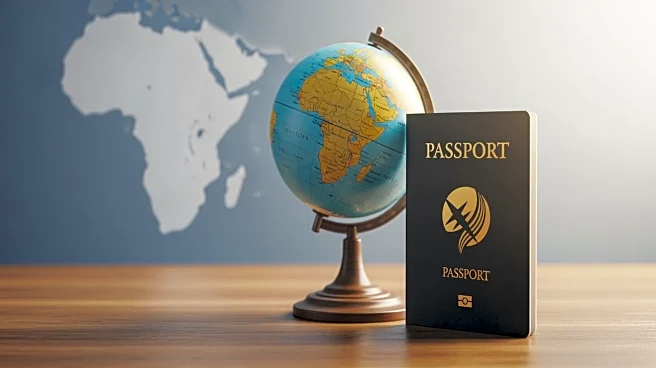What's Happening?
France has issued an urgent advisory for its citizens in Mali to leave the country due to a fuel blockade imposed by jihadist insurgents. The French foreign ministry has recommended that citizens depart
on commercial flights while they are still available and avoid overland travel. The blockade, orchestrated by the al-Qaeda-affiliated group Jama'at Nusrat al-Islam wal-Muslimin (JNIM), has severely disrupted daily life in Mali, affecting fuel supplies and electricity. This situation has led to long queues at petrol stations and has prompted the world's largest shipping company, MSC, to halt operations in Mali. The blockade has exacerbated the security situation in the country, which is currently under the rule of a military junta led by Gen Assimi Goïta. The junta, which took power in 2020, initially had popular support due to promises to address the security crisis caused by a separatist rebellion and subsequent Islamist militant activities.
Why It's Important?
The ongoing fuel blockade in Mali highlights the persistent instability in the region, which has significant implications for international relations and security. France's advisory for its citizens to leave underscores the severity of the situation and the challenges faced by the military junta in maintaining control. The disruption of fuel supplies and electricity can lead to broader economic and social consequences, affecting both local populations and international businesses operating in Mali. The involvement of Russian mercenaries, hired by the junta to tackle insecurity, further complicates the geopolitical landscape, potentially influencing foreign policy decisions by other nations. The situation in Mali serves as a critical example of the difficulties in addressing insurgencies and maintaining stability in regions with complex political and social dynamics.
What's Next?
The immediate next steps involve the evacuation of French citizens and potentially other foreign nationals from Mali. The international community may increase diplomatic pressure on the Malian junta to resolve the security crisis and restore stability. There could be further discussions on the role of foreign military and mercenary forces in the region, as well as potential humanitarian aid efforts to support affected populations. The ongoing instability may prompt neighboring countries and international organizations to reassess their strategies and involvement in the Sahel region, considering the broader implications for regional security and cooperation.
Beyond the Headlines
The situation in Mali raises ethical and legal questions regarding the use of mercenaries and foreign military interventions in sovereign nations. The reliance on Russian mercenaries by the Malian junta could lead to long-term shifts in alliances and influence in the region, affecting both local governance and international relations. Additionally, the blockade and its impact on daily life highlight the vulnerability of landlocked countries to external disruptions, emphasizing the need for resilient infrastructure and diversified supply chains.









